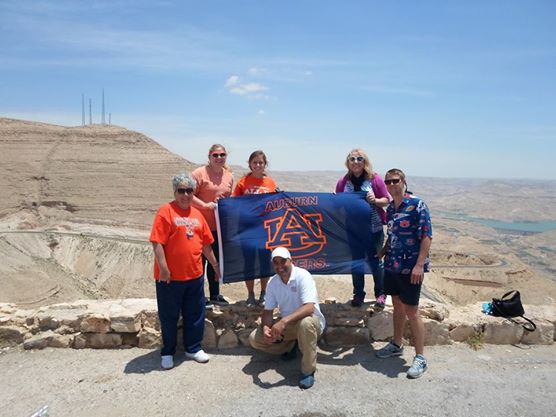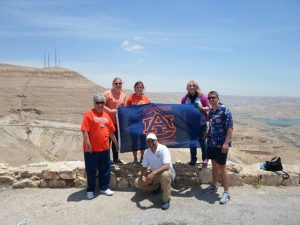 Studying abroad is a unique opportunity to learn of new cultures, different languages, lifestyles, religions, and other ways of life. Growing up in Kentucky, I have never been exposed to Muslim culture or Arabic. When I initially heard about Auburn’s Study Abroad in Jordan, I thought of Ralph Waldo Emerson’s quote, “Never lose an opportunity of seeing anything beautiful, for beauty is God’s handwriting”. The moment we landed on the plane in Jordan the beauty of this country was evident. Ancient ruins, medieval castles, beautiful deserts, and strong Biblical history are found within Jordan. It is also home to Petra, one of the world’s seven wonders.
Studying abroad is a unique opportunity to learn of new cultures, different languages, lifestyles, religions, and other ways of life. Growing up in Kentucky, I have never been exposed to Muslim culture or Arabic. When I initially heard about Auburn’s Study Abroad in Jordan, I thought of Ralph Waldo Emerson’s quote, “Never lose an opportunity of seeing anything beautiful, for beauty is God’s handwriting”. The moment we landed on the plane in Jordan the beauty of this country was evident. Ancient ruins, medieval castles, beautiful deserts, and strong Biblical history are found within Jordan. It is also home to Petra, one of the world’s seven wonders.
Through many lectures we attended at JAU, Jordan Applied University, we learned that there are six types of tourism in Jordan: archeology (28,000 sites), religion (Jordan is referred to as The Holy Land), ecology (deserts), wellness (Dead Sea), adventure (scuba diving in the Red Sea), and conventions and meetings (business travel). Jordan has a lot to offer tourists of many different backgr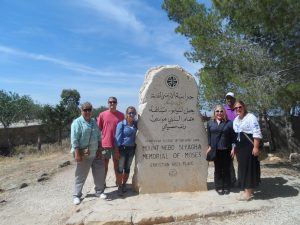 ounds. JAU provides training to students to help raise standards, provide quality employees as well as exceptional customer service in Jordan. Visiting the tourism board was insightful. We became aware of some of the challenges that Jordan faces in the area of tourism. The stigma of being a Middle Eastern country does not help in the area of tourism. Jordan is by far the safest country in the Middle East. Christians and Muslims have been living in accord since the founding of the country. Educating people is very important for Jordan Tourism. Social media is a great outlet to reach out to other countries to show the beauty of this country. Through mediums such as Facebook and Twitter tourists can share pictures and post information about their visits. Those that have never been to the Middle East will be mesmerized by the beauty. This could very well encourage others to book a flight to Jordan.
ounds. JAU provides training to students to help raise standards, provide quality employees as well as exceptional customer service in Jordan. Visiting the tourism board was insightful. We became aware of some of the challenges that Jordan faces in the area of tourism. The stigma of being a Middle Eastern country does not help in the area of tourism. Jordan is by far the safest country in the Middle East. Christians and Muslims have been living in accord since the founding of the country. Educating people is very important for Jordan Tourism. Social media is a great outlet to reach out to other countries to show the beauty of this country. Through mediums such as Facebook and Twitter tourists can share pictures and post information about their visits. Those that have never been to the Middle East will be mesmerized by the beauty. This could very well encourage others to book a flight to Jordan.
Jordan is referred to as the Holy Land for the many Biblical Sites that are found within the country. Mt. Nebo is where Moses saw the Promise Land; this is als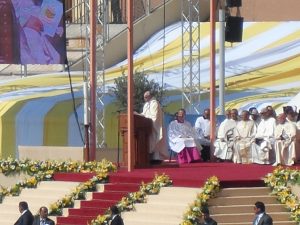 o the site where he is thought to be buried. Umm Qais is where Jesus casted two demonic men into swine, The Baptism Site on the Jordan River where John the Baptist baptized Jesus, Mukawir where John the Baptist was beheaded and The Red Sea, the sea Moses parted. While we were in Jordan Pope Francis became the fourth Pope to visit the Holy Land. We were fortunate enough to receive invitations to the Pope’s Mass in Amman by a manager at the Century Park Hotel. This is a great example of the great hospitality shown to us on our visit.
o the site where he is thought to be buried. Umm Qais is where Jesus casted two demonic men into swine, The Baptism Site on the Jordan River where John the Baptist baptized Jesus, Mukawir where John the Baptist was beheaded and The Red Sea, the sea Moses parted. While we were in Jordan Pope Francis became the fourth Pope to visit the Holy Land. We were fortunate enough to receive invitations to the Pope’s Mass in Amman by a manager at the Century Park Hotel. This is a great example of the great hospitality shown to us on our visit.
The Bedouin originate in families who are current or former dessert-dwellers. This culture is embedded in many Jordanians who take hospitality to heart. They are genuinely interested in making sure all guests are comfortable and happy. Hospitality and laughter are universal. This has been evident to me as we visited Dr. Ayoun’s family in Irbid. Although there was a language barrier, the host family did everything possible to treat us like family. It was great to be able to joke around with the family with Dr. Ayoun translatin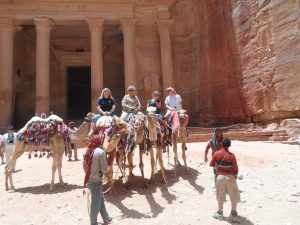 g in English and Arabic. During dinner, every time we would finish a side dish the family would add more to our plate. It was hilarious because we got so full, but the food was amazing. I really enjoyed being able to see how the dishes were prepared and all the hard work that goes into producing a Jordanian meal. In the United States, many times we get so caught up with work and our daily lives that we grab fast food and eat in our cars. Here we were shown that family is a huge part of the culture in Jordan. Every one in the family helps cook, set the table, serve drinks, and clean up. The desire to take care of people and treat your neighbor as family is not embedded in many cultures today, but it remains a way of life in Jordan.
g in English and Arabic. During dinner, every time we would finish a side dish the family would add more to our plate. It was hilarious because we got so full, but the food was amazing. I really enjoyed being able to see how the dishes were prepared and all the hard work that goes into producing a Jordanian meal. In the United States, many times we get so caught up with work and our daily lives that we grab fast food and eat in our cars. Here we were shown that family is a huge part of the culture in Jordan. Every one in the family helps cook, set the table, serve drinks, and clean up. The desire to take care of people and treat your neighbor as family is not embedded in many cultures today, but it remains a way of life in Jordan.
Jordan is among the ten most-poor countries in the world. The absence of natural resources constitutes a major constraint to the country’s developme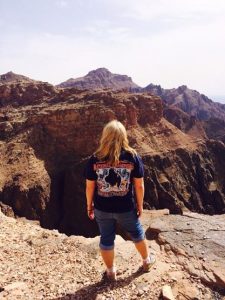 nt. However, with a growing amount of refugees from Syria the lack of water and electricity continues to be detrimental. Before this trip I had never stayed in a hotel that had green key cards. These cards are necessary for electricity use and without them the power shuts off. This is to preserve the resources. Because of this I have gained a different perspective while on this trip and I have made a conscious effort to cut down on electricity while not needed and water while showering and brushing my teeth. If I don’t need the light on to see I’ve been turning it off.
nt. However, with a growing amount of refugees from Syria the lack of water and electricity continues to be detrimental. Before this trip I had never stayed in a hotel that had green key cards. These cards are necessary for electricity use and without them the power shuts off. This is to preserve the resources. Because of this I have gained a different perspective while on this trip and I have made a conscious effort to cut down on electricity while not needed and water while showering and brushing my teeth. If I don’t need the light on to see I’ve been turning it off.
There is a quote by Maya Angelou that best describes a valuable lesson I learned while spending three weeks studying abroad in Jordan, “Perhaps travel cannot prevent bigotry, but by demonstrating that all peoples cry, laugh, eat, worry, and die, it can introduce the idea that if we try and understand each other, we may even become friends”. This trip was very enlightening and helped me form a positive outlook on those living in the Middle East. My opinions, world views, and my own personal meaning of hospitality have changed in three weeks. Leaving Jordan, we left behind new found friendships that I know will continue thanks to the reach of social media. I am so thankful the HRMT department at Auburn offers this study abroad opportunity and I would encourage any students interested to go on this trip.
— Mary Owens | Auburn Abroad in Jordan, Summer 2014
